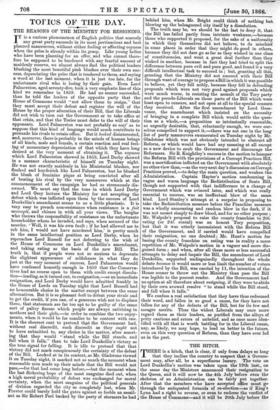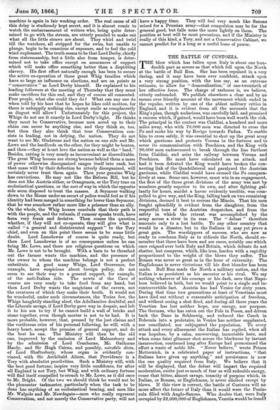THE HITCH.
THERE is a hitch, that i clear, if only from delays so long 1 that they incline the country to suspect that a Govern- ment may, after all, be a superfluous luxury. The vote on Lord Dunkellin's motion was taken upon the 19th inst., on the same day the Ministers announced their resignation to the Queen, and it will now be the 4th July before even the skeleton of an Administration can be fairly put together. After that the members who have accepted office must go through the antiquated formula of re-election—as if King's Lynn had a right to reverse, or even to endorse the verdict of the House of Commons—and it will be 20th July before the . machine is again in fair working order. The real cause of all this delay is studiously kept secret, and it is almost comic to -watch the embarrassment of writers who, being quite deter- mined to go with the stream, are utterly puzzled to make out what all the little straws are about. They whirl and twirl -till the watchers, all stripped for the swim, but unable to plunge, begin to be conscious of exposure, and to feel the cold wind unpleasant. The truth seems to be that Lord Derby, chiefly from statesmanship, but a little also from temper, is deter- mined not to take office except on assurances of support which will make office something better than a dispiriting slavery. His first effort naturally enough has been to secure the active co-operation of those great Whig families which have so large an influence on elections, and are on points as 41 conservative" as Lord Derby himself. He explained to his leading followers at the meeting of Thursday that they must make sacrifices for this end, and they of course all consented. Poor people, what else could they do I What can any one do when told by his host that he hopes he likes cold mutton, for there is unhappily nothing else, except smile as complacently as disgust will allow Unfortunately for this project, the Whigs do not see it exactly in Lord Derby's light. He thinks -they must be Conservative, because men acred up to their 'chins can never be anything else, and they think so, too, but then they also think that true Conservatism con- sists in leading, not in defying, the nation. They do not want to see Mr. Gladstone and the nation on one side and Mr. Lowe and the landlords on the other, for they might be beaten, and then—they at heart love the nation as well as the "land." Besides, ratting is very nearly as inconvenient as discreditable. -The great Whig houses are strong because behind them a mass -of power otherwise disorganized ranges itself into rank, but that mass will by their defection be utterly disorganized, will 'certainly never trust them again. Then your genuine Whig has convictions. He may not like the Reform Bill, but he does not like Austria either, or Orangemen, or the Tory tone on ecclesiastical questions, or the sort of way in which the opposite side seem disposed to treat the masses. A Seymour walking down to the House under an escort of police would feel as if his identity had been merged in something far lower than Seymour, that he was somehow rather more like a prisoner than an ally. On the whole, the Whig houses conclude that their path is with the people, and the refusals, if rumour speaks truth, have 'been very frank and decisive. Then comes the question whether, if they will not co-operate, they will give what is called "a general and disinterested support" to the Tory .chief, and even on this point there seems to be some little doubt. Lord Lansdowne of course is quite ready, but -then Lord Lansdowne is of no consequence unless he can bring Mr. Lowe, and there are religious questions on which Mr. Lowe is not to be brought. With a barn to be thrashed -out the farmer wants the machine, and the presence of the owner to whom the machine belongs is not a perfect substitute. A good many Whigs, Lord Grosvenor, for -example, have suspicions about foreign policy, do not seem to see their way to a general support, for example, -of the anti-Italian side. The newts of the Cave of eotuse are very ready to take food from any hand, but then Lord Derby wants the magicians of the cavern, not the creatures of which they make their broth. It would not be wonderful, under such circumstances, the Tories few, the Whigs haughtily standing aloof, the Adullamites doubtful, and -the Liberals savage, if Lord Derby gave way in despair, and left it to his son to try if he cannot build a wall of bricks and stone together, even though mortar is not to be had. It is more probable, however, that, pressed by the just claims and the vociferous cries of his personal following, he will, with a heavy heart, accept the promise of general support, and do -the best he can. The Ministry will then be the old one, improved by the omission of Lord Malmesbury and by the admission of Lord Cranborne, Mr. Gathorne Hardy, and Sir Hugh Cairns, and possibly, rnirabile dictu, of Lord Shaftesbury, whose organ is evidently con- vinced, with Sir Archibald Alison, that Providence is a Tory with absolutist proclivities. Such a Ministry will, with the best good fortune, inspire very little confidence, for after -all England is not Tory, but Whig, and with ordinary fortune will find itself compelled to crouch to Mr. Lowe, as it did once to Mr. Bright. Of the two we should think he would not be the pleasanter taskmaster, particularly when the task to be -done has anything of an ecclesiastical bearing, and men like Mr. Walpole and Mr. Newdegate—men who really represent Conservatism, and not merely the Conservative party, will not
have a happy time. They will feel very much like Saxons seized for a Prussian army—that compulsion may be for the general good, but falls none the more lightly on them. The position at best will be most precarious, and if the Ministry is really of this kind, a Tory, and not a Conservative Cabinet, we cannot predict for it a long or a useful lease of power.































 Previous page
Previous page